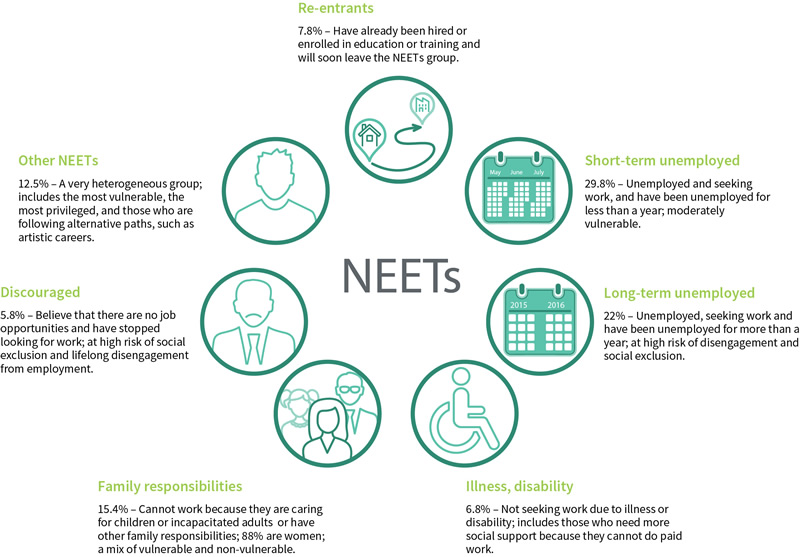EU context
A fogalmat 2010. óta széles körben használják a 28 uniós tagállamban mutatóként az ifjúságorientált szakpolitikák tájékoztatására.
A NEET-fiatalokra először különösen az „Európa 2020: Mozgásban az ifjúság” elnevezésű kiemelt kezdeményezésről szóló európai szakpolitikai viták során hivatkoztak. A fogalom a 15–24 éves korosztályt fogta át, később pedig kiterjesztették a 15–29 éves korosztályra. A fogalom mára az uniós szintű szakpolitikai viták központi részévé vált. Jelenleg a 15–29 éves korosztály 14,2%-a NEET-fiatal.
2013 áprilisában elfogadták az Európai Bizottság Európai Unió Tanácsához benyújtott javaslatát a valamennyi tagállamban végrehajtandó ifjúsági garanciáról. A NEET-fiatalok számának csökkentése az ifjúsági garancia kifejezett szakpolitikai célkitűzése. E kezdeményezés annak biztosítását tűzte ki célul, hogy a 15–24 év közötti fiatalok az állásuk elvesztését, illetve a tanulmányaik befejezését követő négy hónapon belül továbbképzésben, illetve tanulószerződéses gyakorlati képzésben vegyenek részt, szakmai gyakorlatot végezzenek vagy képesítésüknek megfelelő állásajánlatot kapjanak. Az ifjúsági garancia ifjúsági foglalkoztatási kezdeményezés útján való tagállamokbeli megvalósulása hozzájárult a helyzet alapvető javításához a NEET-fiatalok számának mérséklésével.
Újabban, 2016. december 7-én az Európai Bizottság meghirdette a Befektetés az európai ifjúságba című kezdeményezést, amely újabb erőfeszítést jelent az ifjúság támogatására. Az ifjúsági garancia máig tapasztalt pozitív hatásaira tekintettel a Bizottság növelni kívánja és ki akarja terjeszteni az ifjúsági foglalkoztatási kezdeményezés rendelkezésére álló pénzügyi forrásokat 2020-ig, az ifjúság hatékonyabb elérésének ösztönzése érdekében.
Az Eurofound munkája
Az ifjúsági garancia végrehajtásával a 15–29 éves korosztályhoz tartozó NEET-fiatalok száma 2016-ra kissé csökkent, a válság legmélyebb időpontjában tapasztalt 14 millióról 12,5 millióra (14,2%). Az Eurofound kutatásának becslése szerint azonban továbbra is jelentős, évi 142 milliárd euró veszteség (2015) érheti az európai gazdaságokat – a juttatások és az elmaradó bevételek és adók tekintetében. Ez jelentős hatással van az Európai Unió gazdasági és szociális fejlődésére.
Legfontosabb hozzájárulások
Jelenleg az Eurofound élen jár a NEET-fiatalokra vonatkozó kiterjedt kutatások területén (lásd a lenti kiadványokat), és:
- elvégezte a NEET-fiatalokra vonatkozó első uniós összehasonlító elemzést
- megmagyarázta, hogy kik azok a NEET-fiatalok
- megbecsülte a NEET-fiatalok gazdasági költségeit
- kutatta a NEET-fiatalokhoz tartozás társadalmi következményeit
- megbecsülte a NEET-fiatalok kategóriájához tartozás kockázati tényezőit
- kutatta a NEET-fiatalok újbóli beilleszkedésére irányuló szakpolitikák hatékonyságát
- nyomon követte az ifjúsági garancia végrehajtását.
A NEET-fiatalok sokfélesége
E kutatás részeként az Eurofound megkísérelte feltárni a népesség NEET-fiatalokból álló részének sokszínűségét. A NEET-fiatalok sokféleségére vonatkozó utolsó tanulmány új, hét alcsoportot alkotó kategorizálást vezet be az ifjúság e csoportja összetételének jobb megértése érdekében. A cél a politikai döntéshozók jobb támogatása annak jobb megértésében, hogy kik a NEET-fiatalok, és a megfelelő támogatási intézkedések kialakításának támogatása a széles körű igények kielégítése érdekében. E csoportok mindegyike kiszolgáltatott és nem kiszolgáltatott helyzetben lévő fiatalok vegyes csoportja, akik szándékosan vagy nem szándékosan nem növelik hivatalos csatornákon keresztül a humántőkét.

Egyéb kutatási témák
A fenti tanulmány mellett az utóbbi években az Eurofound az alábbiakat kutatta (lásd a lenti kiadványokat):
- a fiatal vállalkozók jellemzői és értékei
- hogyan lehet bevonni a „hiányzó középréteget”: azokat a középfokú végzettséggel rendelkező fiatalokat, akik nem tanulnak tovább a felsőoktatásban
- a fiatalok társadalmi befogadása
- a fiatalokat érintő átmenetek a munkaerőpiacon
- a határozott munkaidejű foglalkoztatás elterjedése a fiatalok körében és a szociális védelemhez való hozzáférés
- a munkaerőpiacra belépő fiatalok munkakörülményei
- a NEET-fiatalokhoz kapcsolódó újabb szakpolitikai fejlemények.
Lásd a lent felsorolt kiadványokat.
Középpontban: A NEET-fiatalok sokszínűségének felmérése
2016. július 4. - az Eurofound 2012. évi NEET-fiatalok – a foglalkoztatásban részt nem vevő fiatalok című jelentését folytatva ez a jelentés hét olyan javasolt alcsoport segítségével kutatja a NEET-fiatalok sokféleségét, amelyekre a népesség NEET-fiatalokból álló része felosztható, a 2013. évi Európai Uniós munkaerő-felmérésből kinyert adatok felhasználásával. Ezekkel az alcsoportokkal jobban vizsgálható, hogy a szakpolitikák, a szociális klíma és a munkaerőpiac lassú de fokozatos fejlődése milyen hatással van a 28 uniós tagállamban élő NEET-fiatalokra. Segítségükkel felismerhető, hogy mit kell tenni a problémák kezeléséhez, ha például a tartós munkanélküliség a 15–24 éves korosztályhoz tartozó NEET-fiatalok 22%-át érinti. A NEET-fiatalok sokféleségére vonatkozó 28 országprofil ugyancsak hozzáférhető, és betekintést enged a NEET-fiatalok tagállami szintű helyzetébe. Az ifjúsági munkanélküliség trendjeit vizsgálja, valamint a NEET-fiatalok számát, a NEET-fiatalok csoportjainak összetételét, és a társadalmi kirekesztés őket fenyegető kockázatát.
A NEET-fiatalok sokszínűségének felmérése
NEETs infografika















